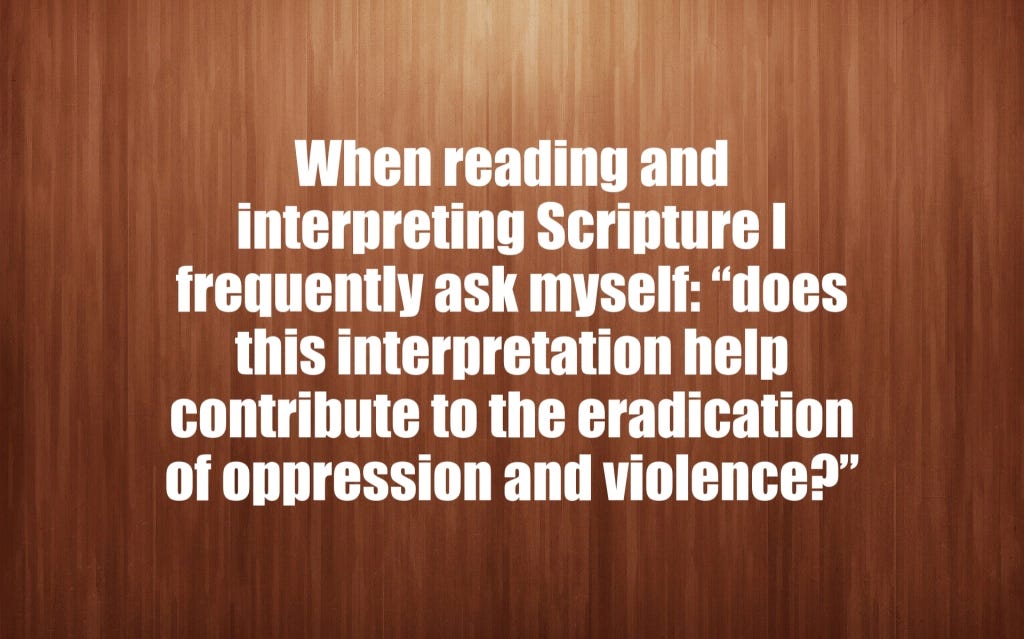Day 7: Reading the Bible
#RethinkChurch is doing a 22-day journey for self-reflection based on John Wesley’s 22 questions. I will be trying to compose short blog posts addressing each question. I am using these posts to encourage Christians, especially Progressive and Mainline Christians to reflect deeply on what it means to be Church in a world marred by oppression and violence.
Day 7: Did the Bible live in me today?
Growing up I was taught that the Bible was the inerrant and infallible word of God, perfect (in its original written form). It was strongly encouraged that Christians read the Bible every day and we had Bible study once a week that would last about two hours (or more), plus most Sunday school classes was dedicated to studying specific Biblical stories or verses.
If I had been asked, "did the Bible live in me today," as a child, I would have rattled off specific Bible verses such as Hebrews 4:12 and Joshua 1:8 to demonstrate that, of course the Bible lived in me: I can recite Scripture. And to be fair, reading and studying the Bible is important. I know many Evangelical and Fundamentalist Christians who can run circles around many non-clergy Progressive Christians when it comes to spouting off Bible verses.
The theology of my youth claimed to place a high value on the Bible: anything that was viewed as contradictory to the “literal” Word of God was to be discarded as false. Evolution was condemned because it contradicted the Genesis stories about the six days of creation. The Bible was even used to justify why women should wear skirts and not pants (Deuteronomy 22:5) and why women needed to have long hair (1 Corinthians 11:14-15).
Fundamentalist Christianity does a great job of quoting Scripture but often times Scripture becomes a weapon to further injustice. I can’t tell you how many times I have heard Scripture quoted to justify denying members of the LGBTQ+ community legal rights, to deny women reproductive rights, to argue for “prayer” in school, (which is of course legally allowed, no one is trying to prevent students from praying if they wish, what is not allowed is forcing all students to pray), and to “prove” why most people will burn in hell.
Moreover, the faith of my youth required that we more or less treat our interpretation of Scripture as the only correct way. There was room for some disagreement over details such as did God create the earth in six literal 24 hour periods or can each “day” represent thousands of years ?(but not millions) The Bible does say that for God, “one day is like a thousand years, and a thousand years are like one day?” (2 Peter 3:8). But major disagreements regarding Biblical interpretation were prohibited.
But it was only after leaving Fundamentalist Christianity behind that I began to understand what it means to allow the Bible to “live” in me. Once I let go of Biblical inerrancy and literalism I was exposed to the full richness and complexity of the Bible. I learned in college and seminary about the contradictions within the Bible-how, for example, there are two creation stories in Genesis.
I learned that there are numerous ways to interpret different stories and verses in the Bible and that even those who claim to take the Bible literally and seriously also have to make interpretative choices. Growing up I was taught that Mainline Christians would cherry pick verses to support their interpretations, but the reality is that Fundamentalists do that as well. The Bible is too big and complex for there to be only a handful of “correct” interpretations. Some may make more sense in light of historical context and linguistic concerns than other interpretations, but very rarely is there only one “true” interpretation.
This realization was both liberating and terrifying. It was liberating because, I always struggled with taking some verses as literally true such as the idea that God commanded his followers to kill every living thing in a war. Knowing that the Bible is so complex and that Biblical literalism is not necessarily a useful lens through which to interpret it, put my mind at ease. I still had to grapple with why certain verses and stories were canonized, but I no longer had to assume that every single statement about God the Bible made was true.
But it was also terrifying. Fundamentalist Christianity provides certainty and stability in a world that is anything but. It provides a clear list of theological beliefs that one needs to ascribe to in order to go to heaven. Rejecting the inerrancy of the Bible and allowing for multiple interpretations of Scripture provides more questions than answers.
Discarding Biblical inerrancy meant searching for a new interpretative lens that was both flexible and took seriously the historical context of each Biblical book/text individually and holistically. I think one of the reasons I have been drawn to Progressive Christianity is because of its focus on compassion and social justice. This focus allows for a variety of interpretations and for historical context, translation issues, etc. to be addressed and taken seriously. But it also provides a focal point that can help us as we navigate through this world.
When reading and interpreting Scripture I frequently ask myself: “does this interpretation help contribute to the eradication of oppression and violence?” Viewing the Bible in this way allows Scripture to be a living and dynamic entity in our lives, as opposed to a dead, lifeless book that needs to be interpreted in one way.
Day 1: Illusions of Perfection
Day 2: The Dangers of Embellishment
Day 3: Loose Lips Sink Ships or Silence Kills?



